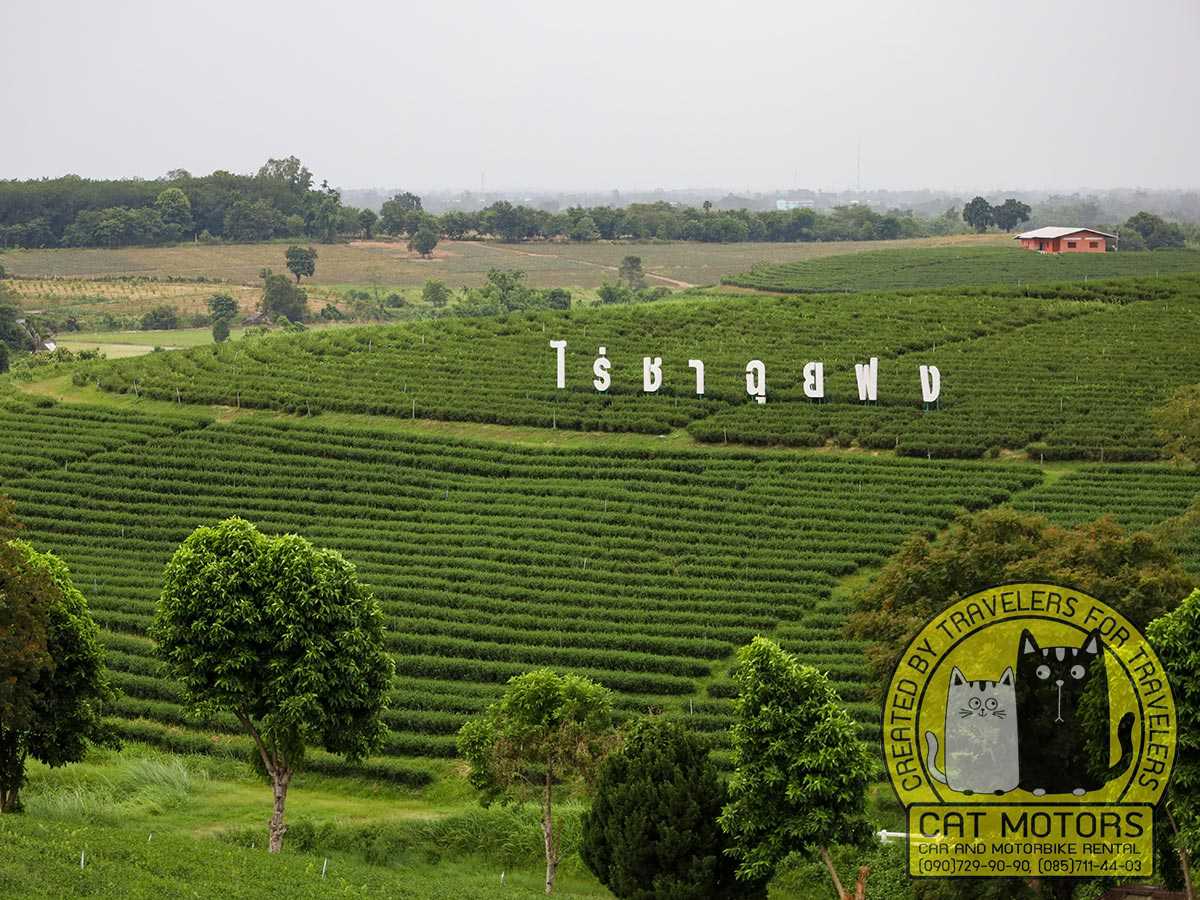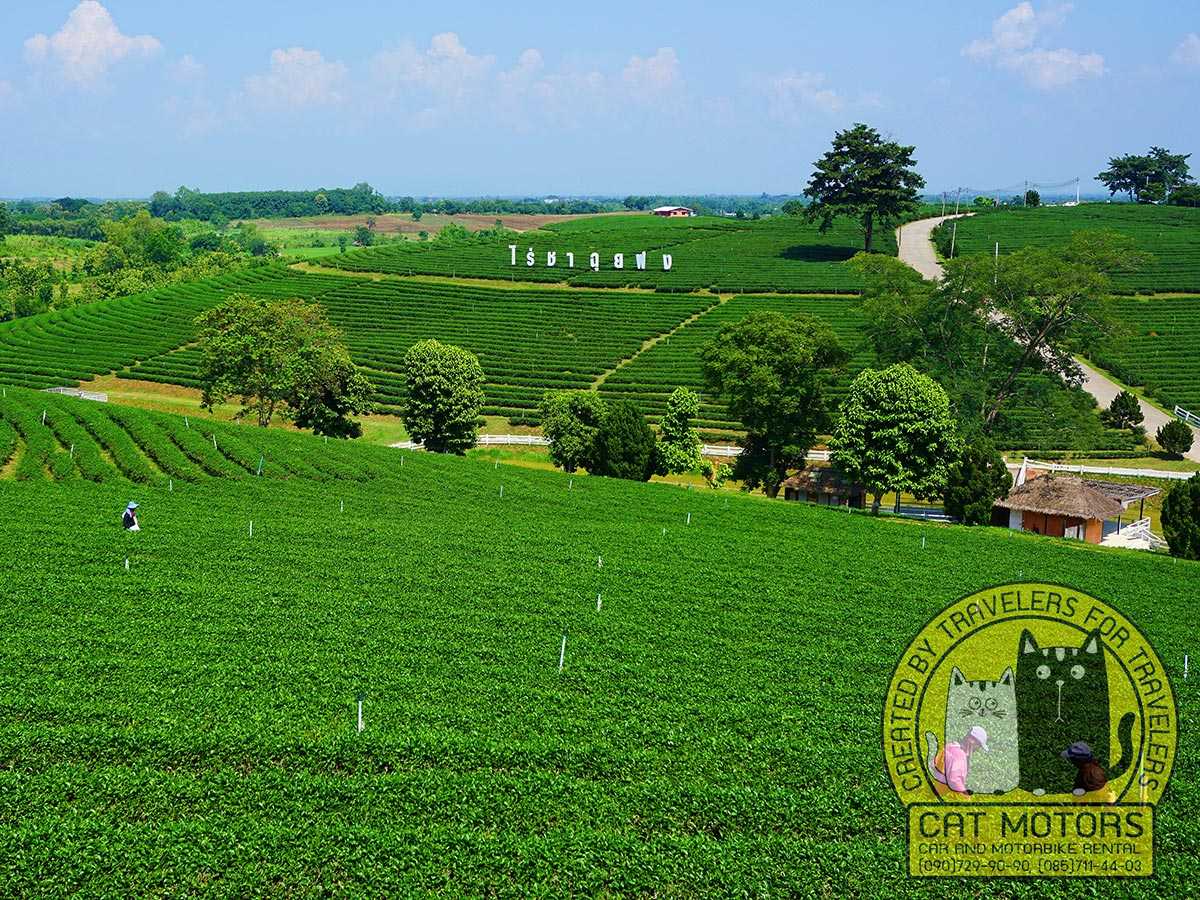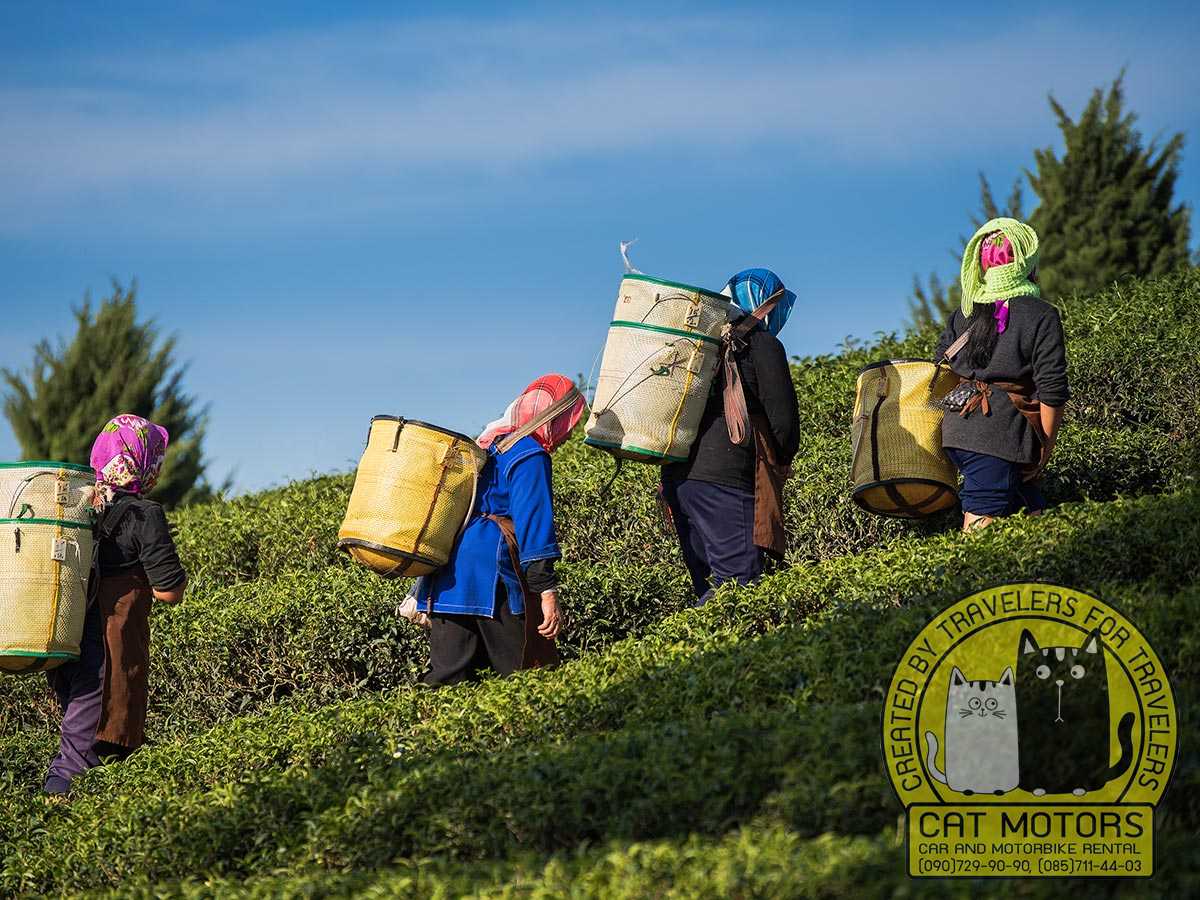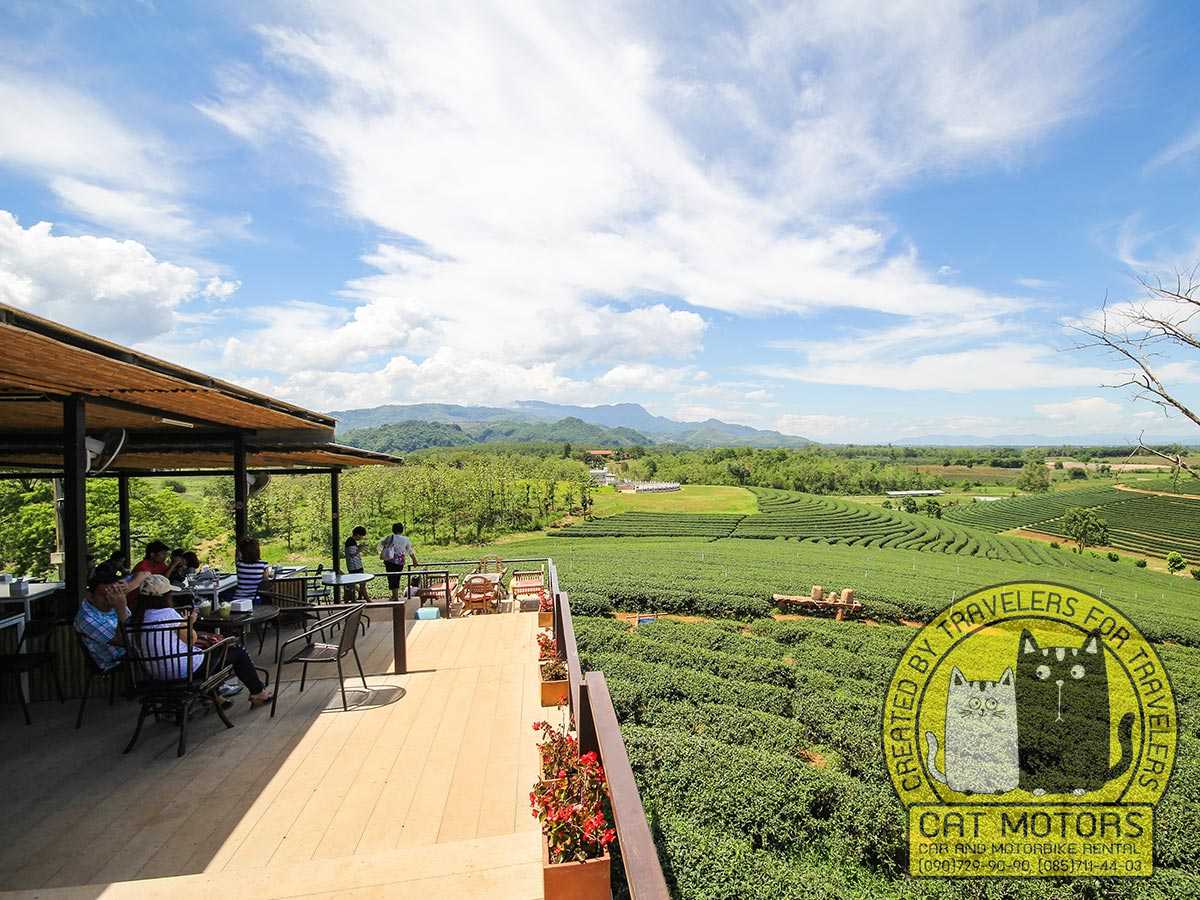Choui Fong Tea Plantation: Unveiling 4 Aromatic Treasures
The verdant hills stretch endlessly with their countless rows of bushes. When you’ve had enough of the city’s bustling markets and crowded tourist spots, a trip to Choui Fong Tea Plantation is a refreshing escape. Strolling through the plantation and savoring tea and cake is a true delight for the soul.

Choui Fong Tea Plantation (Google Map) is located 40 km (25 miles) north of Chiang Rai in the Mae Chan district. The 192-hectare (1200-rai) farm sits at an elevation of 500-1200 m (1640–4000 feet) above sea level, offering the ideal climate and rich soil for cultivating high-quality crops. Choui Fong has two locations, one in Mae Chan and another in the Mae Fah Luang area.
The Mae Chan site features two shops where visitors can sample the plantation’s tea varieties, along with desserts and cakes infused with tea flavors. These shops overlook the farm, providing a stunning view for guests while they enjoy their food. There are also excellent spots for taking photos of the plantation from various angles.
The Story Of The Largest Chiang Rai Tea Plantation
With a vision of growing tea that would become world-famous for its flavor and quality, the founder of Choui Fong, Thawee Wanaspitaksakul, planted his first crop in 1977 at Doi Payapai Mae Fah Luang. He worked tirelessly, blending traditional cultivation methods with modern expertise, while studying the region’s climate and soil.
The original farm covers 498 rai (79 hectares/197 acres) of land, densely planted with terraced bushes. After nearly thirty years of perfecting his craft at Doi Payapai Mae Fah Luang, Thawee Wanaspitaksakul opened another farm in Mae Chan in 2003. The plantation remains a family-owned business and the largest producer in Chiang Rai province.
Though there are no formal tours, visitors can stroll through designated areas. Afterward, enjoy a tasting session and explore the retail shops, offering delicious food, desserts, and drinks.
While there are no restaurants at the original site, you can drive to the top of Doi Mae Salong and take the road to the right at the junction to enjoy the sight of exquisite tea bushes cascading down the terraces.
The Thai Food and Drug Administration has recognized Choui Fong for its quality and safety standards. It is GMP-certified and has received multiple awards for excellence.
The History And Significance Of Thai Tea
Thailand’s tea culture is relatively new and has developed due to two influences: the Thai Royal Projects and Chinese immigrants who moved to Thailand.
King Bhumibol Adulyadej wanted to eradicate opium cultivation in Thailand and found that the climate, elevation, and soil were ideal for growing it. He realized he needed to create an alternative income for those depending on opium and initiated various Royal Projects.
The king requested Taiwanese experts to identify varieties suitable for cultivation in Thailand. Thai Royal Projects then imported Jin Xuan Oolong No.12 and Ruan Zhi Oolong No.17, giving them to local farmers willing to switch from opium crops. Tea is a sustainable crop that continues to bolster the economy of local communities.

Thus, the king provided locals with an alternative, sustainable income and eradicated the opium trade within a short period.
The second influence on Thai tea production was the Kuomintang forces, pushed back into Thailand by Mao’s communist party in 1961. They planned to resume their struggle, but it became impossible. Instead, they settled in Northern Thailand, bringing their culture, language, traditions, and love of tea cultivation to the area.
While Thailand initially produced tea only for domestic use, the industry has studied its cultivation and improved production to now export excellent varieties worldwide.
What Happens Between Leaf And Cup?
Choui Fong workers carefully handpick the leaves at harvest time, as it became clear that machine harvesters cause damage. Tea harvests happen twice yearly, in spring and summer, but workers constantly prune the bushes by picking only the buds and top two leaves.

The processing plant is on-site because leaves begin oxidizing immediately after harvest. All true teas (as opposed to herbal varieties) come from the same plant, but oxidation levels determine the type and flavor.
Oxidation occurs when oxygen reacts with organic matter, changing its appearance and taste. During production, experts maintain precise control over this process to create each variety. Depending on the type, they may process the leaves by withering, steaming, roasting, rolling, drying, and oxidizing them in different sequences. All for a perfect cup!
Savor The Aromatic Choui Fong Teas
The plantation cultivates several types of organic varieties, including Green, Oolong, Black, and Assam. You can purchase them from the plantation’s website.
Green Tea
Tea aficionados describe it as having vegetal, floral, and grassy notes, with a good body and fruity undertones. Pair Choui Fong’s green tea with light dishes like sushi, steamed fish, or vegetable stir-fries. Its crispness and clean finish complement delicate flavors.
Brewing instructions: Let boiled water cool to 80-90°C (176-194°F). Infuse one teaspoon per cup (8 oz) for 2-3 minutes until it turns golden yellow. Serve without any additions.
Oolong Tea
Oolong can have a deep amber or light green hue, offering a floral taste with a smooth finish and medium-bodied flavor. Being only semi-oxidized, it’s milder than black varieties. Its versatility pairs well with a wide range of foods, including roasted meats, grilled seafood, or mildly spiced dishes.
Brewing instructions: Use boiled water cooled to 85-90°C (184-194°F). Steep for 3-4 minutes. Use one teaspoon if the leaves are rolled into balls, or up to two tablespoons if they are large and open.
Black Tea
Black teas undergo the most processing of all types, including withering, rolling, and oxidation before drying. Choui Fong’s black tea, made from premium leaves, offers a full-bodied taste with a dark brown or amber color and a rich, lingering flavor.
Brewing instructions: Steep one teaspoon of loose-leaf tea for about five minutes, using water just off the boil.
Assam Tea
While most teas come from Camellia Sinensis var. sinensis, Assam tea is derived from Camellia Sinensis var. assamica. Fully oxidized, it produces a dark brown liquid with malty flavors and earthy aromas.
Brewing instructions: Steep 1.5 teaspoons of loose-leaf Assam in a cup (8 oz) of water just below boiling for five minutes.
Visiting The Verdant Tea Plantation
If you’re a nature lover or a tea enthusiast, it’s easy to lose a few hours at the plantation. Operating hours are from 8:30 AM to 5:30 PM, so there’s plenty of time to stroll along the designated paths, enjoying the aroma of the bushes and the fresh mountain air. You can take photographs, end your visit at the tea shops for refreshments, and purchase souvenirs.
The best way to get to the plantation from Chiang Rai is by hiring a car or taxi. Private tours that include a visit to Choui Fong are more convenient, as transport is included. To reach Choui Fong from Chiang Rai, simply follow Route 1 for approximately 49 minutes. It’s impossible to get lost!
Entrance to the plantation is free. If visitors don’t intend to walk around the farm, the weather is unimportant. But if you plan to be outdoors, the best season to visit is during the cooler, drier months from November to February.
The Two Tea Cafes
In 2015, the plantation opened its first café, seating 150 people. Located on the hill to the left as you enter the grounds, it serves drinks and baked goods and features tea-making demonstrations and a souvenir shop. The modern building was designed to blend into the hillside while offering stunning views of the tea farm.
Other Must-See Attractions Near Choui Fong Tea
When visitors make the trip to the tea plantation, they will find some less typical but equally fascinating attractions in the vicinity.
Doi Tung Royal Villa
Approximately 9.8 km (6.1 miles) from the Choui Fong Plantation, visitors will find Doi Tung Royal Villa, the summer residence of Princess Srinagarindra, the late Princess Mother. The villa is open from 7 AM – 5.30 PM, and visitors pay an entrance fee of 90 baht.
Mae Sai
About 32.6 km (20 miles) north of Choui Fong plantation lies the town of Mae Sai, marking the border between Thailand and Myanmar. It takes approximately 30 minutes to reach Mae Sai from the plantation. The area boasts many attractions that would appeal to visitors, including the lovely temple, Wat Phra That Doi Wao, Tham Luang Cave, and Khun Nam Nang Norn Forest Park.
Quick Facts
Location: Choui Fong Tea Plantation is located in the picturesque region of Chiang Rai, Thailand.
Spectacular Setting: Nestled amidst rolling hills and lush greenery, the plantation offers breathtaking panoramic views, making it a paradise for nature lovers and photographers.
Tea Varieties: The plantation specializes in producing a wide range of high-quality teas, including green, oolong, and black.
Cultivation Techniques: Choui Fong employs traditional and sustainable methods, ensuring exceptional flavor and aroma in its products.
Tea Tasting: Visitors can enjoy tea tasting sessions, sampling various types while expanding their knowledge and palate.
Tea Appreciation Workshops: The plantation offers workshops on brewing techniques, proper tasting methods, and the cultural significance of tea.
Scenic Tea Trails: Explore well-maintained trails winding through the fields, immersing yourself in the serene beauty of the tea plants.
Tea Shop: The on-site store sells loose-leaf varieties, accessories, and souvenirs, perfect for finding unique gifts for tea lovers.
Tea-Centric Cuisine: The plantation’s restaurant serves tea-infused dishes and desserts, offering a delightful culinary experience.
Photography Opportunities: Capture the vibrant landscapes and scenic vistas, perfect for photography enthusiasts.
Cultural Immersion: Visitors can engage with locals, learn about tea ceremonies, and gain insights into Thai traditions.
Relaxing Atmosphere: The tranquil surroundings make it an ideal retreat to unwind, take a leisurely stroll, and enjoy the natural beauty.
Choui Fong Tea Plantation provides an immersive experience for tea lovers, nature enthusiasts, and travelers seeking a peaceful getaway.

Our Summary
Choui Fong Tea Plantation offers a refreshing alternative to typical tourist attractions in Thailand. Visitors can breathe in the fresh mountain air and enjoy the fragrant tea fields by walking around the farm or taking in the views from the popular hilltop cafés. A visit to this family-owned plantation is the perfect way to escape the city and explore Thailand’s emerging tea culture.
FAQ
The best time to visit Choui Fong Tea Plantation is during the cool and dry season, which typically runs from November to February. The weather is pleasant, with clear skies and comfortable temperatures, allowing you to fully enjoy the plantation’s scenic beauty.
From Chiang Rai city, you can hire a taxi or take a private car to reach Choui Fong Tea Plantation. The journey takes approximately 1-2 hours, depending on the traffic conditions. If you’re arriving by air, you can hire a taxi or arrange for a private transfer from Chiang Rai International Airport to the plantation.
Yes, guided tours are available at Choui Fong Tea Plantation. Knowledgeable guides will take you through the tea fields, provide insights into tea cultivation, and offer information about the plantation’s history and practices. It’s a great way to enhance your experience and learn more about the tea-making process.
Choui Fong Plantation produces a range of teas, including green, oolong, and black. Each variety has its own unique flavors, aromas, and characteristics. You can sample and purchase these teas at the plantation’s tea shop.
Yes, visitors can participate in tea tasting sessions and workshops at Choui Fong Tea Plantation. These sessions provide an opportunity to learn about different tea varieties, brewing techniques, and the art of tea appreciation. It is recommended to book in advance by contacting the plantation or through their official website to secure your spot.
Yes, Choui Fong Tea Plantation has well-maintained trails that wind through the tea fields, offering a scenic and immersive experience. You can explore these paths, enjoy the natural surroundings, and witness the tea plants up close. Remember to wear comfortable shoes and carry water for your hike.
Yes, there is an entrance fee to visit Choui Fong Tea Plantation. The fee covers access to the plantation, the tea fields, tea tasting sessions, and other facilities. The specific entrance fee can be obtained by contacting the plantation or checking their official website.
While there are no accommodations directly at Choui Fong Tea Plantation, there are several options available in the surrounding area. You can find hotels, resorts, and guesthouses in Chiang Rai city or nearby Mae Chan district. It’s advisable to book your accommodation in advance, especially during peak travel seasons.
Yes, you can purchase tea products and souvenirs at the tea shop within Choui Fong Tea Plantation. They offer a variety of high-quality products, including loose-leaf teas, tea bags, and accessories. Additionally, you can find unique souvenirs such as tea sets, teapots, and locally made crafts.
While participating in tastings or ceremonies at Choui Fong Plantation, it is customary to show respect and appreciation for the tea. This includes following the guidance of the tea experts, using proper tea etiquette, and expressing gratitude for the experience. It’s a wonderful opportunity to embrace Thai tea traditions and immerse yourself in the local culture.
Yes, there are several attractions and landmarks near Choui Fong Tea Plantation that you can explore. Some popular options include visiting the Golden Triangle region, exploring the White Temple (Wat Rong Khun), and experiencing the local markets and temples in Chiang Rai city. These attractions can be combined with a visit to the plantation to create a well-rounded itinerary.
Photography is allowed and encouraged at Choui Fong Tea Plantation. The picturesque landscapes, tea fields, and scenic views provide ample opportunities for capturing stunning photographs. However, it is recommended to be respectful of the surroundings, follow any designated photography guidelines, and obtain permission if you wish to take photographs of people or employees at the plantation.
Discover the wonders of Northern Thailand through our detailed travel guides that showcase the best scenic routes and local attractions. To get started, visit our maxi scooter rental in Chiang Mai homepage for reliable rental options. Be sure to review our rental terms to understand all necessary details. These resources will help you prepare for a safe and enjoyable adventure through Northern Thailand’s beautiful landscapes and cultural sites.
Additionally, explore our advice sections for tips on safe riding, interacting with locals, and finding the best food spots. This information will enhance your travel experience and help you connect more deeply with the region.
If you find inaccuracies in the text or want to add interesting information for our readers, feel free to message us at any time.
Was this post useful for you?
You can rate it by clicking on a star
Average rating / 5. Vote count:
No votes so far! Be the first to rate this post.
We are sorry that this post was not useful for you!
Let us improve this post!
Tell us how we can improve this post?
- Author: Krit Sorenser
- Updated: March 26, 2025
- No Comments




